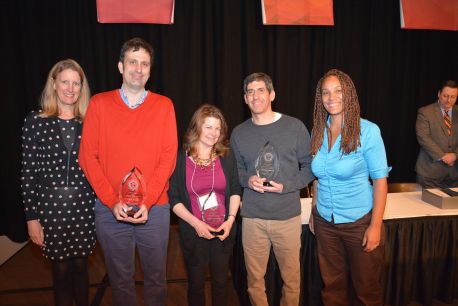April 11, 2016
Three Receive Hall Award for Innovation

(SARATOGA SPRINGS, N.Y. – April 11, 2016) Three staff members who created an automated early-alert system to identify at-risk students at the beginning of the term and provide follow-up intervention, are the recipients of SUNY Empire State College’s Hall Award for Innovation. They are Carl Burkart, director of student and academic services, Metropolitan region, Brett Sherman, director of academic support, Metropolitan region, and Stephen Simon, assistant director for new applications and hosted systems, Information Technology Services.
The three received their award at the annual Empire State College Foundation awards dinner during the All College Conference held at the end of March in Saratoga Springs, N.Y.
President Merodie Hancock said, “Congratulations. I join the cabinet, the foundation board and the rest of your colleagues in extending my thanks and appreciation for your extraordinary efforts on behalf of our students. Thanks also to all those who support the foundation’s mission and programs."
In making the announcement, last year’s recipient Professor Rhianna Rogers said, “This year’s Hall Award for Innovation is being given to a team of outstanding individuals, from multiple locations, for their project dedicated to student retention. Over the past two years, these three individuals have collaborated to implement an automated early-alert system designed to identify at-risk students early in a term and to track follow-up intervention. This is the first fully automated early-alert system to be utilized at the college.
“This survey system helps identify students at risk of failing,” Rogers added. Most importantly, it does so in time for staff to address their issues and help them to succeed in the current term. Their system has proven to be quick and easy for faculty to use and provides automated communication and tracking. This project, which was undertaken through their own initiative, will pave the way for building out the student success and retention modules in the new CRM system. This survey project will form the basis for a collegewide early-alert system, enhance a culture of early engagement across the college and contribute to the ultimate success of our students.”
“These two (Burkhart and Sherman) do the leg work,” said Simon. “It was awesome teamwork.”
“We could not have do it without him (Simon),” said Sherman.
Simon and Sherman said the desire to help students persist was their motivation. “I did not think this was going to happen, I am speechless,” Sherman added.
Burkhart said, “I am surprised and very grateful to my team in student services for making this work.”
About the Hall Award for Innovation
The James William and Mary Elizabeth Hall Award for Innovation is given periodically to a college employee who creates, or puts into effect, an innovation that advances Empire State College’s mission and benefits the college’s students.
About SUNY Empire State College
Empire State College, the nontraditional, open college of the SUNY system, educates more than 20,000 students worldwide at eight international sites, more than 35 locations in the state of New York, online, as well as face to face and through a blend of both, at the associate, bachelor’s and master’s levels. The average age of an undergraduate student at the college is 35 and graduate students’ average age is 40.
Most Empire State College students are working adults. Many are raising families and meeting civic commitments in the communities where they live, while studying part time.
In addition to awarding credit for prior college-level learning, the college pairs each undergraduate student with a faculty mentor who supports that student throughout his or her college career. Spacing is off here Working with their mentors, students design an individual degree program and engage in guided independent study and course work onsite, online, or through a combination of both, which provides the flexibility for students to choose where, when and how to learn.
Students have the opportunity to enroll five times during the year.
The college’s 73,000 alumni are active in their communities as entrepreneurs, politicians, business professionals, artists, nonprofit agency employees, teachers, veterans and active military, union members and more.The college was first established in 1971 by the SUNY Board of Trustees with the encouragement of the late Ernest L. Boyer, chancellor of the SUNY system from 1970 to 1977.
Boyer also served as United States commissioner of education during the administration of President Jimmy Carter and then as president of the Carnegie Foundation for the Advancement of Teaching.
More information about the college is available at www.esc.edu.
Media contact: Hope Ferguson, senior writer
518-587-2100, ext. 2509
Hopeesc.edu
518-321-7038 (after hours and on weekends)
